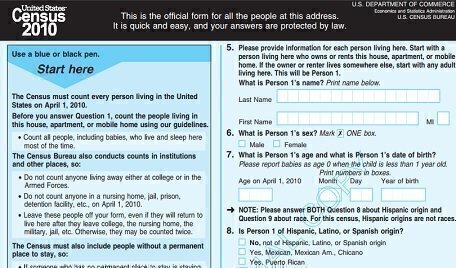With the Supreme Court poised to act soon on the constitutionality of asking everyone in America next year about their citizenship, a rancorous dispute has broken out over new claims of partisan bias by the Trump Administration in preparing for the next census.
 The accusation last week by groups challenging the addition of the citizenship question to 2020 census forms was met on Monday by an accusation by administration lawyers that the challengers were attempting to “derail” the Justices’ imminent decision.
The accusation last week by groups challenging the addition of the citizenship question to 2020 census forms was met on Monday by an accusation by administration lawyers that the challengers were attempting to “derail” the Justices’ imminent decision.
The curious fact about the dueling complaints is that the Supreme Court may simply pay no attention. While the Justices have been made aware of this feud, it is not clear that they will take it into account, in any way, when they make their decision to allow or to forbid the inclusion of a question about citizenship.
Those opposed to adding that question have no way to gain assurances that the Court will consider their claim at all. That is simply up to the Justices, in their discretion. The administration countered Monday that the new claims simply come too late.
The regular 10-year census has not asked about citizenship since 1950. The challengers contend that putting such a question in 2020 will discourage Hispanic households from responding to the census, for fear of deportation of undocumented relatives living with them or whom they know about.
That, the challengers argue, will result in a significant under-count, causing a loss of political representation and federal funds for states where Hispanics are concentrated. The administration has argued that the use of the question will provide valuable information in enforcing the right of minorities to vote under federal civil rights laws. (Census data is used to determine state populations, in order to control seating allotments in the U.S. House of Representatives, in state legislatures, and in countless state and local elected bodies.)
The challengers simultaneously submitted their new claims last week to the Supreme Court and to a New York City federal judge who had decided the case now awaiting the Justices’ decision.
In their court filings, the challengers relied on new evidence that, they contended, shows that the administration was well aware that including the citizenship question would result predictably in a political advantage to Republicans and whites and cause a disadvantage to Democrats and minorities. That evidence, they said, comes from computer files recently discovered in the home of a now-deceased Republican political operative who has helped the GOP craft partisan gerrymandering plans in many state legislatures and congressional seats.
The administration’s voting rights enforcement argument, the opponents asserted, was a cover-up for ethnic hostility and for hopes of exploiting a known GOP advantage.
In countering those claims Monday, administration lawyers sought to refute, point-by-point, all of those claims. The administration official who decided to ask that the citizenship question be added to the 2020 census was not even aware of the evidence the challengers have submitted, according to the government’s new court filings. The supposed link between the administration official and the files of the late Republican operative was only an “imagined” one, based on “pure speculation,” the filings said.
The replying documents questioned the reliability of each part of the challengers’ evidence and suggested that the challengers had been aware for months of the materials they were now citing and had decided only to bring them forth in “an eleventh hour” attempt to put pressure on the Supreme Court to rule their way.
At this stage, without knowing whether or how the Supreme Court might react, the one clear likelihood is that this new round of controversy will play out this week in a federal courtroom in New York City.
Both sides have now completed their competing filings in the Supreme Court and in the trial court of U.S. District Judge Jesse M. Furman, who will begin his review at a meeting with lawyers on Wednesday afternoon. He is one of the three federal judges who have ruled that the administration cannot legally ask the citizenship question as part of the census, and it is Judge Furman’s decision that the Supreme Court is now reviewing.
The specific request by the challengers to that judge is that he should impose some form of punishment on two Justice Department officials who had a role in advising the Commerce Department (which manages the census) to include the citizenship question.
That plea is based on the claim that those two officials gave false or misleading testimony in the case about their awareness, at the time, that adding the question would skew the census results to favor Republicans.
It is not clear whether Judge Furman could do anything about the citizenship question dispute even if he were to find misconduct by officials involved in the process. That question is now awaiting the Supreme Court decision, and thus it is technically out of Judge Furman’s hands.
Administration lawyers, besides arguing Monday that the judge should impose no sanctions on the government officials, contended that lawyers for the challengers should have made an investigation before going public with their “inflammatory accusations.”
Those lawyers, the administration documents said, “appear to have spent more time coordinating with the media … than performing the requisite investigation.”
Lyle Denniston has been writing about the Supreme Court since 1958. His work has appeared here since mid-2011.







